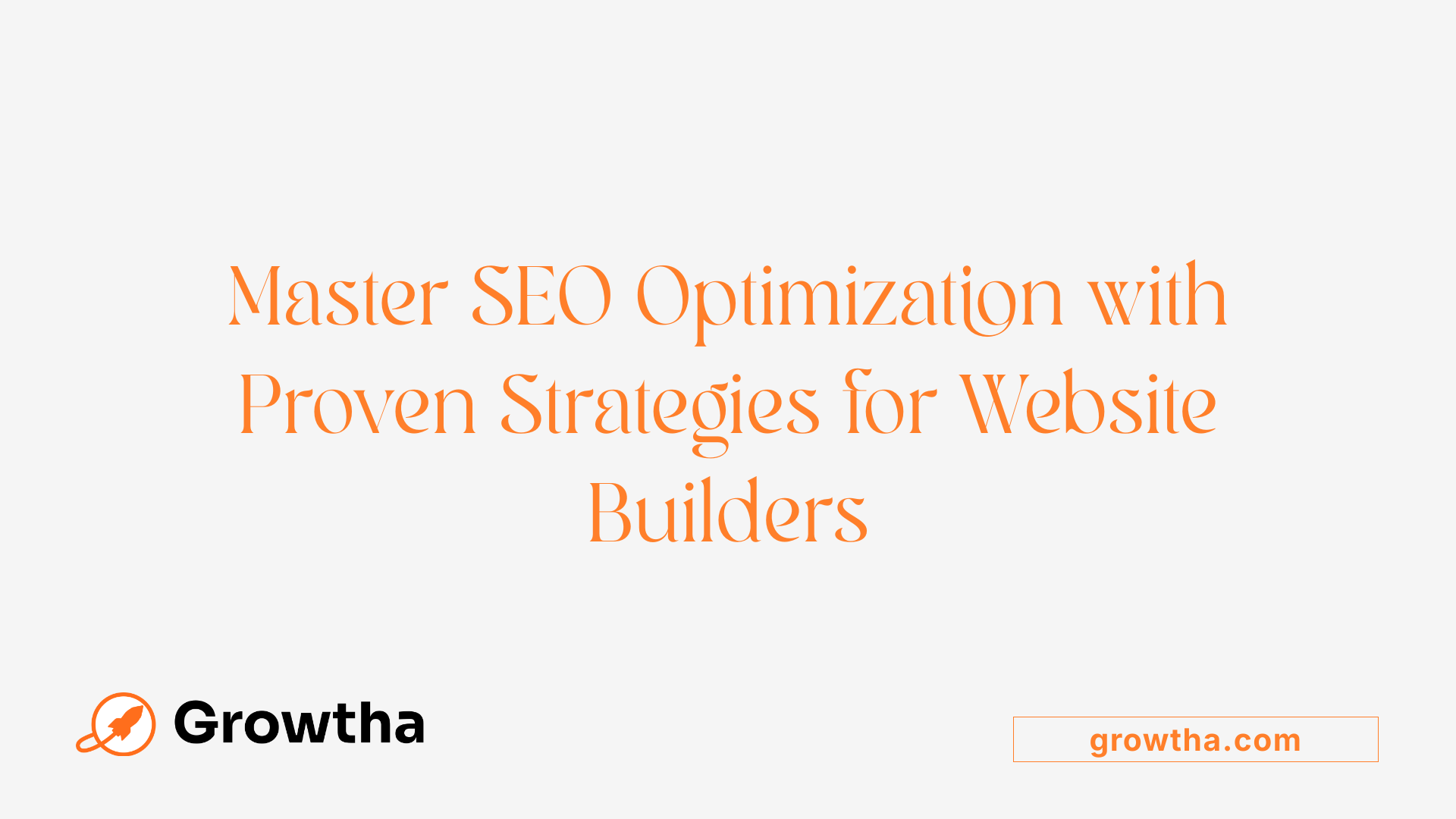What Website Builder Has the Best SEO?
Discovering the Top SEO-Optimized Website Builders for 2025


What Website Builder Has the Best SEO?
Why SEO-Friendly Website Builders Matter in Today’s Digital Landscape
In an increasingly competitive online environment, choosing the right website builder with robust SEO features is vital for ensuring your site ranks well on search engines. With a plethora of options available, understanding which platform offers the best SEO tools can dramatically impact your online visibility and success. This article explores the leading website builders renowned for their SEO capabilities, analyzing their features, integrations, and overall performance to help you make an informed decision.
Wix: The Best Overall SEO Platform in 2025

Built-in SEO tools like meta descriptions, customizable URLs, image alt attributes, header code, and social media integrations.
Wix stands out in 2025 as the top overall SEO website builder because of its comprehensive set of built-in SEO features. It allows users to easily customize meta descriptions for each page, ensuring that search engines display relevant snippets. The platform also supports creating customizable URLs, which help improve keyword relevance and site structure.
Additionally, Wix offers robust tools for adding image alt attributes, making images more accessible and SEO-friendly. Users can insert header code snippets to implement advanced tracking or structured data, further boosting their search visibility. Social media integrations are seamlessly supported, enabling better content sharing and engagement, which can positively influence search rankings.
SEMrush integration for keyword research and competitor analysis.
One of Wix's standout features in 2025 is its direct integration with SEMrush, a leading SEO and digital marketing tool. This integration allows users to access powerful keyword research data straight from their Wix dashboard, simplifying the optimization process.
Users can perform detailed competitor analysis, identify high-value keywords, and track their search performance over time without leaving the platform. This feature is especially beneficial for small businesses and beginners wanting to improve their SEO strategies efficiently.
SEO Wiz guiding beginners through optimization steps.
Wix's SEO Wiz is designed to support users at all skill levels, particularly beginners. This step-by-step guide prompts users through essential SEO tasks, such as setting up meta tags, optimizing URLs, and improving mobile responsiveness.
The wizard customizes recommendations based on the website's content and goals, making SEO accessible for those unfamiliar with technical details. This guidance ensures that even novice users can implement effective SEO practices easily and confidently.
Multilingual support for international SEO.
Recognizing the importance of global reach, Wix offers extensive multilingual support. It enables website owners to create and manage content in over 180 languages, surpassing many competitors.
This feature helps optimize websites for international audiences by implementing hreflang tags, managing translations, and providing localized metadata. This support significantly enhances a site's visibility in different regions and helps attract a broader audience.
Sitemaps and structured data support.
Wix simplifies technical SEO with automatic sitemap generation, which helps search engines crawl and index website pages more effectively. Users can manage and submit these sitemaps directly within the platform.
Moreover, Wix supports structured data markup to enhance search result appearances, such as rich snippets for reviews, products, or articles. These tools assist in improving search visibility and click-through rates.
| Feature | Description | Benefit |
|---|---|---|
| Built-in SEO tools | Meta descriptions, URLs, image alt, header code, social | Ease of optimization, control, rich features |
| SEMrush integration | Keyword research, competitor analysis | Data-driven SEO strategies |
| SEO Wiz | Guided SEO steps for beginners | User-friendly, accessible SEO |
| Multilingual support | 180+ languages, hreflang, localization | International SEO benefits |
| Sitemaps & structured data | Automatic sitemap, schema markup | Better crawlability, richer search results |
Which website host is best for SEO?
The best website host for SEO in 2025 varies based on specific requirements. Leading options include WPX, Siteground, ScalaHosting, HostPapa, and Wix. Each offers specialized features like high uptime, fast server response times, security, and support for SEO tools.
Wix, in particular, excels because of its integrated SEO tools, ease of use, and scalable features that cater to small and medium-sized businesses. For users needing advanced customization or technical control, WordPress hosting from providers like Siteground might be preferable.
How does Webflow perform in SEO?
Webflow is known for generating clean, semantic HTML and CSS code, which search engines love. It offers comprehensive control over SEO-critical elements like meta tags, URLs, and schema markup.
Additionally, Webflow's fast load times and mobile-first design contribute positively to SEO rankings. The platform's flexibility makes it suitable for both beginners and advanced users aiming for optimized site performance.
Is Wix still a good choice for SEO?
Yes, Wix remains a strong choice in 2025, especially for small businesses and beginners. Its user-friendly interface, built-in SEO tools, and dedicated guidance like SEO Wiz make it easy to implement best practices.
Though it may lack some advanced features of platforms like WordPress or Webflow, Wix balances ease of use with powerful SEO fundamentals, making it a dependable option for a wide range of users.
Which website builder offers the best SEO tools and functionalities?
WordPress is often regarded as the top leader in SEO due to its extensive customization potential. With over 50,000 plugins like Yoast SEO and Rank Math, users have access to comprehensive on-page and technical SEO tools.
Its flexibility, support for schema markup, easy content optimization, and scalability make WordPress ideal for long-term and large-scale SEO strategies.
What are the best SEO tools available for website optimization?
Some of the most effective SEO tools include:
- Google Analytics: Traffic and behavior insights
- Ahrefs: Backlink analysis and keyword research
- SEMrush: Complete SEO and PPC analysis
- Moz Pro: Site audits and keyword tracking
- Screaming Frog: Technical SEO audits
- Yext: Local SEO and citations
These tools help identify opportunities, monitor progress, and refine SEO strategies.
What factors contribute to a website builder's SEO effectiveness?
Several factors influence how well a website ranks:
- Technical features: sitemap, robots.txt, canonical tags
- Site speed and performance
- Mobile responsiveness
- Content quality and keyword optimization
- Structured data markup
- User experience and navigation
- Backlink profile and social media engagement
A well-rounded approach encompassing these elements yields the best SEO results.
Squarespace’s Advanced Mobile Optimization and Structured Data Features
How does Squarespace handle automatic schema markup?
Squarespace automatically generates schema markup for various content types such as articles, stores, and event pages. This structured data helps search engines better understand the content on your website, enhancing visibility in rich snippets and other search features.
What is the integration with Google Search Console?
Squarespace seamlessly integrates with Google Search Console, allowing users to verify site ownership, monitor search performance, and identify potential issues. This direct integration simplifies the process of tracking SEO metrics and optimizing website visibility.
Why is mobile responsiveness critical for SEO?
Given the increasing number of mobile users, search engines prioritize mobile-friendly websites in their rankings. Squarespace emphasizes mobile responsiveness, ensuring that websites load quickly and display correctly on all devices, which is vital for improving search ranking and providing a good user experience.
Additional Built-in SEO Features
Apart from structured data and mobile responsiveness, Squarespace offers customizable meta tags, URL structures, alt tags for images, and automatic sitemap generation. These features support comprehensive on-page SEO strategies.
Examples of Squarespace’s SEO tools in action
In practice, Squarespace’s automatic content markup and speed optimization tools assist small businesses and content creators in reaching higher search rankings without extensive SEO technical knowledge. The platform’s focus on clean, lightweight code and structured data makes it easier to implement best SEO practices.
Future insights
As SEO continues to evolve, Squarespace's features like structured data support and mobile optimization will stay relevant, especially as search engines enhance their focus on user experience across all devices.
Concise summary in table format
| Feature | Description | Impact on SEO |
|---|---|---|
| Automatic schema markup | Automatically adds structured data to content | Enhances rich snippets and search visibility |
| Google Search Console integration | Streamlines verification and monitoring | Facilitates continuous SEO improvements |
| Mobile responsiveness | Ensures site adapts to all device screens | Improves rankings and user experience |
Final notes
Choosing a website builder with robust mobile and structured data features can significantly influence your SEO success. Squarespace offers a balanced suite of tools that cater well to owners aiming for easy, yet effective SEO management, especially for small to medium-sized websites.
Shopify and Hostinger: Streamlined E-Commerce SEO Solutions
How do Shopify and Hostinger handle automatic SEO tasks, canonical tags, sitemaps, and AI tools?
Shopify simplifies SEO management by automating essential technical SEO elements, which is especially beneficial for online stores. It automates the creation of canonical tags to prevent duplicate content issues, generates comprehensive XML sitemaps for easy indexing, and manages responsive design to ensure mobile-friendliness. These features operate seamlessly without requiring user intervention, allowing store owners to focus on product listing and marketing.
Additionally, Shopify integrates with Google Analytics to track visitor data and user behavior, providing valuable insights for optimizing content and improving store performance. The platform also supports rich snippets, schema markup, and internal linking strategies to enhance search visibility.
Hostinger, known for its affordability, also handles automatic SEO essentials. It offers features like auto-generated sitemaps, URL redirections, and optimization for site speed—crucial factors for improving search rankings. Its AI SEO Support further enhances website optimization by giving personalized recommendations on content structure and keyword usage. This AI-driven guidance helps users optimize their pages effectively and efficiently.
How does AI-generated product descriptions and content optimization benefit e-commerce sites?
Shopify leverages AI tools like Shopify Magic to generate SEO-friendly product descriptions quickly. These AI-generated descriptions are tailored to include relevant keywords, improving the chances of ranking higher in search results. Moreover, AI assists in content optimization across product pages, blog posts, and other content types, ensuring that text aligns with SEO best practices.
This automation saves time for store owners and enables the creation of compelling, optimized content that enhances user experience and boosts organic traffic. Accurate and keyword-rich descriptions can also improve click-through rates from search engine results pages.
Which website host is best for SEO?
While WPX and Siteground are highly regarded for their performance and reliability, Shopify offers specialized tools perfect for eCommerce. It provides built-in SEO features tailored for online stores, including schema markup, product tagging, and URL customization.
Hostinger stands out as an affordable option that still provides solid SEO fundamentals, such as site speed optimization, auto sitemaps, and AI-based recommendations. Depending on specific needs—whether full control, ease of use, or eCommerce focus—these hosts can suit different SEO strategies.
How does Webflow perform in SEO?
Webflow excels in providing advanced control over SEO elements. It enables users to fine-tune title tags, URLs, and meta descriptions directly within its visual editor. The platform generates semantic, clean code that loads quickly—vital for on-page SEO.
Its flexibility in customizing schema markup and managing redirects supports large-scale SEO efforts. Webflow’s hosting infrastructure also ensures fast load times and high uptime, making it suitable for SEO-focused websites.
Is Wix still a good choice for SEO?
Wix remains a solid choice for beginners and small business owners due to its user-friendly interface and integrated SEO tools. The platform offers an SEO Wiz that guides users through optimizing meta tags, URLs, and mobile optimization.
However, compared to platforms like WordPress, Wix’s advanced SEO capabilities are somewhat limited. For basic to intermediate SEO needs, Wix performs well, but for more complex strategies, more customizable platforms may be preferable.
Which website builder offers the best SEO tools and functionalities?
WordPress is widely recognized as the leader in SEO flexibility owing to its extensive plugin ecosystem, including popular tools like Yoast SEO and Rank Math. It allows comprehensive control over all SEO elements from meta descriptions, headers, to schema markup.
WordPress’s open-source nature and customizability facilitate tailored SEO strategies. Its themes are optimized for speed, and its community provides ongoing support for SEO best practices.
What are the best SEO tools available for website optimization?
Some of the most effective SEO tools include:
| Tool Name | Main Features | Suitable For |
|---|---|---|
| Google Analytics | Traffic analysis, user behavior tracking | All websites |
| SEMrush | Keyword research, site audit, competitor analysis | SEO professionals, marketers |
| Ahrefs | Backlink analysis, keyword research | Advanced SEO strategies |
| Screaming Frog | Technical SEO audit, crawl analysis | Technical SEO, developers |
| Yoast SEO | On-page SEO guidance, XML sitemaps, content analysis | WordPress sites |
These tools provide insights into site performance, keywords, backlinks, and technical issues, forming a comprehensive strategy for SEO improvement.
What factors contribute to a website builder's SEO effectiveness?
A website builder’s success in SEO depends on multiple factors:
- Site speed: Fast-loading websites rank higher and provide better user experience.
- Structured data: Proper schema markup enhances search result appearance.
- Content quality: Well-written, relevant content attracts and retains visitors.
- Mobile responsiveness: Mobile-friendly design is critical, as mobile traffic dominates search engines.
- Technical SEO features: Customizable URLs, canonical tags, meta descriptions, and sitemaps facilitate proper indexing.
- Ease of optimization: The platform should support easy editing of SEO elements and integration with analytics.
Platforms like WordPress, Wix, and Webflow excel in these aspects, thus enhancing overall SEO performance.
WordPress: The Industry Leader in SEO Customization and Plugins
Which website host is best for SEO?
When it comes to hosting for SEO, many providers such as WPX and Siteground are well-regarded for their reliability and speed. However, what truly makes WordPress stand out is its extensive ecosystem of SEO plugins, which provide advanced tools and customization options. These plugins help manage everything from meta tags to schema markup, ensuring optimal SEO performance.
How does Webflow perform in SEO?
Webflow delivers strong SEO capabilities with its focus on clean, semantic code that aligns with search engine algorithms. It offers users extensive options for customizing titles, meta descriptions, and URLs. Additionally, Webflow's built-in tools simplify the creation of XML sitemaps and schema markup, which are vital for search visibility.
Is Wix still a good choice for SEO?
Wix is known for its ease of use and beginner-friendly interface, making it suitable for those new to SEO. It includes built-in features like a guided SEO Wiz, customizable meta tags, and mobile optimization. But for advanced SEO strategies and more extensive customization, WordPress's flexible environment and plugin support typically offer a more powerful solution.
Which website builder offers the best SEO tools and functionalities?
Among the numerous options, WordPress shines as the most flexible and expandable platform. Its vast plugin library, including popular tools like Yoast SEO and Rank Math, allows users to implement comprehensive SEO strategies. WordPress also supports custom code, schema markup, and detailed content optimization, making it ideal for SEO-focused websites.
What are the best SEO tools available for website optimization?
Leading SEO tools include:
- Yoast SEO and Rank Math for on-page optimization and schema markup.
- Google Search Console for monitoring site performance and indexing issues.
- Ahrefs and SEMrush for competitive analysis, keyword research, and backlink tracking.
What factors contribute to a website builder's SEO effectiveness?
Several elements impact SEO efficiency:
- Plugin support for advanced SEO functionalities.
- Site speed and performance.
- Mobile responsiveness, ensuring the site looks and functions well on all devices.
- Structured data implementation for rich snippets.
- Quality of content and relevance to target audiences.
| Platform | SEO Features | Plugin Ecosystem | Best Use Case |
|---|---|---|---|
| WordPress | Extensive meta controls, schema, speed, and plugins | 50,000+ | Full control and advanced SEO |
| Wix | Guided SEO setup, mobile optimization | Built-in | Beginners and quick setup |
| Webflow | Custom SEO settings, clean code | Integrated | Design-focused, technical users |
| Shopify | Ecommerce SEO tools, schema, responsive design | App store | Online stores |
| Squarespace | Built-in SEO tools, fast loading | Limited | Small business and portfolios |
Understanding the overlapping features and distinctions among these builders helps in selecting the best platform tailored to your SEO needs. Remember, the foundation of SEO success is a well-structured, fast, and user-friendly website with high-quality content.
The Role of User-Friendly Interfaces and AI in SEO Optimization
How does Wix's SEO Wiz assist with guided optimization?
Wix’s SEO Wiz stands out as a user-friendly feature designed to help beginners and experienced users alike optimize their websites effectively. It offers a step-by-step guide to improve on-page SEO factors, such as customizing meta tags, URLs, and image alt attributes. By walking users through specific actions, it simplifies the complex process of SEO, ensuring even those without technical background can effectively enhance their site's visibility. This tool also automatically manages sitemap generation and structured data, aligning with best SEO practices.
How do AI tools in Hostinger and 10Web enhance website performance?
AI-powered tools have become increasingly vital in modern SEO strategies. Hostinger employs an AI SEO Assistant that helps optimize site content, structure, and keywords. This tool analyzes your website and provides actionable insights to improve search rankings. Similarly, 10Web integrates AI features aimed at boosting site speed and creating SEO-friendly content. These tools support automatic minification, lazy loading, and content optimization, making it easier for website owners to maintain fast, efficient, and search-engine-friendly websites without deep technical knowledge.
What are the benefits of simplified SEO workflows for beginners?
For newcomers, complex SEO tasks can be daunting. Simplified workflows offered by platforms like Wix, SITE123, and Weebly focus on core SEO practices such as meta descriptions, optimized URLs, and sitemap management. These workflows often include guided prompts, visual dashboards, and automation features that reduce the learning curve. As a result, beginners can implement effective SEO strategies quickly and confidently, leading to better search rankings and increased web traffic.
Which website host is best for SEO?
Hostinger and WPX are top choices for SEO-focused hosting. They prioritize speed and reliability — critical factors Affecting search engine rankings. Their optimized environments support fast load times, essential for user experience and SEO.
How does Webflow perform in SEO?
Webflow offers a perfect blend of design flexibility and SEO optimization. It provides advanced control over SEO elements like title tags, meta descriptions, and URL structures, along with clean, semantic code. This setup ensures fast-loading pages and effective indexing, making it suitable for those with intermediate to advanced SEO needs.
Is Wix still a good choice for SEO?
Absolutely. Wix remains a strong contender for SEO, especially for beginners. Its integrated tools like SEO Wiz significantly lower the barrier to entry, guiding users through essential SEO practices effortlessly. The platform’s mobile optimization, sitemap management, and multilingual support contribute to its effectiveness.
Which website builder offers the best SEO tools and functionalities?
While WordPress is the leader overall, Wix and Hostinger excel in providing ease of use without sacrificing key SEO capabilities. WordPress boasts extensive plugin support like Yoast SEO, offering granular control, whereas Wix and Hostinger offer intuitive, all-in-one solutions suitable for users with limited technical skills.
What are the best SEO tools available for website optimization?
Effective SEO optimization involves various tools such as Google Analytics for performance tracking, SEMrush and Moz for keyword research and competitor analysis, Screaming Frog for technical audits, and AI content generators to create optimized content efficiently. These tools help identify opportunities and troubleshoot issues to boost rankings.
What factors contribute to a website builder's SEO effectiveness?
Several factors impact how well a website builder performs in search engines. Fundamental aspects include a solid technical foundation with clean, semantic code; ease of implementing SEO best practices; site speed; and content relevance. A builder supporting comprehensive SEO features like customizable metadata, schema markup, responsive design, and integration with analytics tools further enhances overall effectiveness.
Additional insights: AI SEO tools
The digital environment increasingly relies on AI-powered SEO tools that automate and refine optimization processes. They analyze website data to suggest improvements, generate SEO-friendly content, and monitor performance metrics, making SEO more accessible and efficient for users across varying skill levels.
This integration of user-friendly interfaces and AI-driven tools ensures that a broad range of website owners can improve their search engine visibility, attract more visitors, and ultimately achieve their online goals with less effort and technical expertise.
Best Practices for SEO Optimization Using Website Builders

Which website host is best for SEO?
When choosing a hosting provider to support your website’s SEO efforts, reliability and speed are paramount. Currently, WPX and Siteground stand out as top choices. Both hosting services are known for their excellent uptime, fast server response times, and optimized environments that support SEO best practices.
WPX offers high-performance hosting tailored specifically for speed and scalability, reducing load times that are crucial for both user experience and search engine ranking. Siteground provides robust security features, reliable uptime, and excellent support, ensuring your website remains accessible and optimized for SEO.
How does Webflow perform in SEO?
Webflow is recognized for its semantic, clean HTML output and fast-loading pages. Its platform gives users full control over crucial SEO elements such as title tags, meta descriptions, URL structures, and schema markup.
Webflow’s emphasis on semantic code and customization allows for better search engine readability and indexing. Its built-in tools for generating sitemaps and managing redirects further enhance its SEO performance, making it a solid choice for designers and developers focused on high search rankings.
Is Wix still a good choice for SEO?
Wix continues to be a strong option for SEO, especially when using its integrated SEO Wiz and optimization tools. With proper setup, Wix websites can rank effectively in search results.
The platform offers features such as customizable meta tags, URL structures, header tags, image alt text, and mobile optimization. Its seamless integration with SEO tools like SEMrush, along with prompts for best SEO practices during site creation, empowers users to improve their search visibility.
Which website builder offers the best SEO tools and functionalities?
WordPress is often considered the leading platform for SEO due to its extensive ecosystem of plugins and customization options. Supported by popular SEO plugins like Yoast SEO and Rank Math, WordPress offers in-depth control over on-page SEO elements, schema markup, and technical SEO features.
Its flexibility allows for detailed optimization tailored to specific needs, making it a favorite among SEO professionals and those with technical expertise.
What are the best SEO tools available for website optimization?
A range of tools assist in enhancing your website’s SEO performance:
- Google Analytics: Tracks visitor behavior and site performance.
- SEMrush: Provides keyword research, site audits, and competitor analysis.
- Moz: Offers keyword insights and SEO analysis.
- Ahrefs: Explores backlinks and competitive analysis.
- Screaming Frog: Performs technical audits, crawling your website for SEO issues.
Using these tools helps maintain and enhance your website’s search engine ranking over time.
What factors contribute to a website builder's SEO effectiveness?
Several crucial factors determine how well a website builder supports SEO:
| Factor | Explanation | Best Practice Examples |
|---|---|---|
| Page speed | Faster sites rank higher and reduce bounce rates | Use built-in caching, optimize images, choose fast hosting |
| Content quality | High-quality, relevant content attracts visitors and backlinks | Regularly update with helpful, original information |
| Site structure | Clear, logical hierarchy aids search engines in indexing | Organize pages hierarchically, use breadcrumb navigation |
| Mobile user experience | Mobile responsiveness affects rankings | Ensure templates are mobile-friendly, test across devices |
| Structured data | Rich snippets improve visibility | Use schema markup for reviews, products, articles |
These elements are supported to varying degrees by most website builders, but customizing and optimizing them is essential for SEO success.
In conclusion, adopting SEO best practices across technical, content, and structural areas is vital. Supplement your website’s built-in features with external tools, continuous content improvement, and regular performance audits. Whether you choose WordPress for ultimate control or platforms like Wix and Squarespace for ease of use, focusing on speed, content, mobile optimization, and data-driven adjustments will ensure your website ranks effectively in search engine results.
For further learning and advanced strategies, search for "SEO best practices" to access tutorials, expert advice, and recent updates. Regularly updating your knowledge helps maintain and improve your website’s search visibility over time.
Implementing Multilingual and Local SEO Strategies

Which website host is best for SEO?
Wix and Siteground are highly regarded for supporting multilingual and local SEO strategies. Wix offers extensive multilingual features with its support for over 180 languages, enabling website owners to reach diverse audiences easily. Its integrated SEO tools, including sitemap management and structured data support, make it straightforward to implement local SEO practices. Siteground, known for its excellent uptime and performance, also provides robust support for local SEO efforts, including optimized server locations and tools for managing hreflang tags.
How does Webflow perform in SEO?
Webflow stands out with its ability to support dynamic content and structured data, both crucial for local SEO and international reach. It allows detailed control over SEO-critical elements such as meta tags, URLs, and schema markup. Its performance in speed and clean code foundation further enhances SEO effectiveness, especially for local search visibility where site performance directly impacts rankings.
Is Wix still a good choice for SEO?
Absolutely. Wix remains a popular choice for SEO, particularly because of its strong multilingual support and AI-guided SEO Wiz. The platform’s ability to handle international websites through automatic and manual hreflang setups makes it especially suitable for businesses targeting global markets. Additionally, Wix’s comprehensive suite of built-in SEO features, including customizable meta tags and structured data, empowers users to optimize their sites effectively.
Which website builder offers the best SEO tools and functionalities?
WordPress, combined with its extensive range of plugins like Yoast SEO and Rank Math, is often regarded as the most flexible and powerful platform for SEO. Its open-source nature allows complete control over on-page and technical SEO elements. The ability to customize HTML, implement schema markup, and manage hreflang tags makes WordPress an optimal choice for those prioritizing comprehensive SEO management.
What are the best SEO tools available for website optimization?
Effective SEO tools include Google Search Console for monitoring site performance and indexing, SEMrush for keyword research and competitive analysis, Moz for site audits and backlinks, and specialized local SEO tools for managing geographic keywords and local citations. These tools aid in identifying technical issues, optimizing content, and enhancing overall search visibility.
What factors contribute to a website builder's SEO effectiveness?
Several factors influence SEO performance across website builders:
- Localization support, including multiple language options
- Implementation of hreflang tags for regional targeting
- Content relevance and quality
- Multilingual support and the ability to create localized content
- Site speed and mobile optimization
- Structured data support and sitemap management Properly addressing these areas ensures the website is well-positioned for local and international search rankings.
Additional Insights
When considering multilingual SEO strategies, focus on tools like hreflang tags, which inform search engines about language and regional targeting. This prevents duplicate content issues and enhances user experience by directing visitors to the most relevant version of a site. In practice, Wix and WordPress provide the most comprehensive tools for managing these settings efficiently.
To further refine your multilingual and local SEO efforts, explore tools like "Multilingual SEO tools" which assist in managing language-specific content, hreflang tags, and region-based keyword optimization. Incorporating these tools into your website strategy will ensure improved visibility in diverse markets, attracting broader audiences and increasing organic traffic.
The Future of SEO in Website Building and Emerging Trends

Which website host is best for SEO?
Future SEO success heavily depends on choosing a high-performance hosting platform. Companies like WPX, Siteground, and ScalaHosting are recognized for their reliable uptime, fast server speeds, and strong security features, all essential for search engine rankings. These hosts provide optimized environments that support quick load times, smooth site performance, and seamless security updates, making them ideal for websites aiming to stay competitive in SEO.
How does Webflow perform in SEO?
Webflow continues to improve its SEO capabilities with an emphasis on modern, clean code, fast load speeds, and strong structural elements. It offers users detailed control over meta tags, URLs, and schema markup, aligning with the latest SEO best practices. Its focus on responsive design and ease of customization helps websites rank better across devices and search engines, demonstrating its ongoing commitment to robust SEO practices.
Is Wix still a good choice for SEO?
Wix remains a competitive option for SEO, especially for small businesses and beginners. Its integrated SEO Wiz guides users through optimization steps, and its ongoing platform enhancements include improved site speed, mobile responsiveness, and AI-driven SEO tools. These developments help Wix sites perform well in search rankings while maintaining user-friendly interfaces suitable for those less familiar with technical SEO.
Which website builder offers the best SEO tools and functionalities?
Among all options, WordPress stands out with its extensive plugin ecosystem, notably Yoast SEO and Rank Math. These tools provide comprehensive control over on-page SEO elements such as meta descriptions, keyword optimization, schema markup, and sitemap management. WordPress’s high level of customizability and support for advanced SEO strategies make it the top choice for those seeking maximum flexibility and control.
What are the best SEO tools available for website optimization?
Leading SEO tools include Google Search Console, SEMrush, ahrefs, Moz, and Screaming Frog. These platforms offer invaluable insights into site performance, keyword rankings, backlink profiles, and technical issues. The rise of AI-driven tools also promises enhanced capabilities for content analysis, keyword research, and on-page optimization. Incorporating these tools into your strategy ensures comprehensive monitoring and continual improvement.
What factors contribute to a website builder's SEO effectiveness?
A website builder’s SEO performance relies on several factors: Site speed, which affects user experience and rankings; robust technical SEO features like schema markup, sitemap generation, and canonical tags; content relevance and quality; mobile optimization since most searches occur on mobile devices; and the integration of AI tools that automate updates and maintain current best practices. Combined, these elements determine a website’s visibility and ranking potential in search engine results.
Using these insights, web creators can plan for an SEO-optimized future, leveraging evolving technologies and tools to improve organic reach and search engine rankings.
Making the Smart Choice for Your SEO Strategy
Choosing the right website builder for SEO is crucial in achieving high search engine rankings, attracting organic traffic, and ultimately growing your online presence. While WordPress remains the leader in customization and plugin flexibility, platforms like Wix and Squarespace offer user-friendly interfaces with powerful built-in SEO features. E-commerce platforms like Shopify also provide specialized SEO tools tailored for online stores. As SEO continues to evolve with AI, voice search, and mobile optimization, selecting a platform that offers scalability, ease of use, and integration with advanced SEO tools will ensure lasting success. Evaluate your technical skills, budget, and business goals to find the best fit — with the right platform, your website can dominate search engine results.
References
- 5 Best SEO Website Builders: Boost Your Rankings in 2025
- 5 Best Website Builders for SEO - Get Discovered on Google - Tech.co
- What is the Best Website Builder for Google Ranking? - Agency Jet
- Best Website Builders for SEO: Rank Well on Google in 2025
- The 7 Best Website Builders for SEO in 2025 - 10Web
- 10 Best Website Builders for SEO - Semrush
- 7 Best Website Builders for SEO in 2025 - Elementor
- 8 Best Website Builders for SEO - Get Organic Traffic - Super







